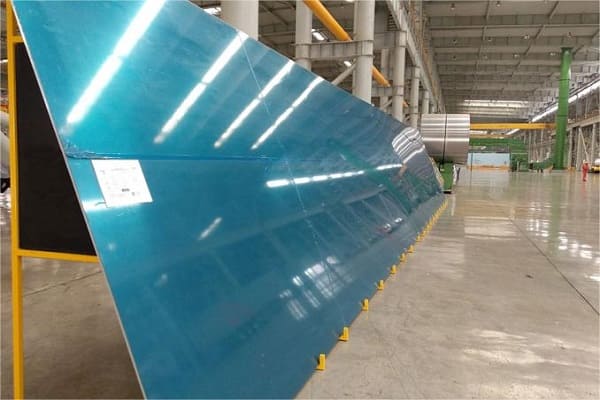Що 5086 сорт алюмінієвого листа?
5086 алюмінієва пластина є одним з 5000 серії (5серія xxx) з підвищеною стійкістю до корозії. 5086 алюмінієва пластина - стійкий до іржі алюміній з високим вмістом металевого магнію. Він широко використовується в сферах застосування, які вимагають високої стійкості до корозії та хорошої зварюваності. сексуальні ситуації та ситуації середньої інтенсивності.
 5086 aluminum-plates
5086 aluminum-plates5086 aluminum sheet chemical composition
| сплав | Mg | Zn | Мн | з | кр | Fe | Individual | Всього |
| 5086 | 3.5~4.5 | ≤0.25 | 0.20~0.7 | ≤0,15 | 0.05~0.25 | 0.000~0.500 | ≤0,05 | ≤0,15 |
Rust-proof 5086 алюмінієвий лист
Aluminum-magnesium alloys and aluminum-manganese alloys are collectively called anti-rust aluminum, because the alloy components between them increase their anti-corrosion properties. Representatives of aluminum-manganese alloys are 3003 алюмінієвий лист, 3004 алюмінієвий лист, і 3105 алюмінієвий лист. Aluminum-magnesium alloys are aluminum sheet 5005 5252 5251 5050 5052 5754 5083 5056 5086, тощо. according to the content of magnesium alloy.
Алюмінієвий лист 5086 common thickness specifications
5086-H32 Aluminum Sheet 0.032″
5086-H32 Aluminum Sheet 0.040″
5086-H32 Aluminum Sheet 0.050″
5086-H32 Aluminum Sheet 0.063″
5086-H321 Aluminum Sheet 0.063″
5086-H116 Aluminum Sheet 0.080″
5086-H32 Aluminum Sheet 0.090″
5086-H116 Aluminum Sheet 0.100″
5086-H116 Aluminum Sheet 0.125″
5086-H32 Aluminum Sheet 0.125″
5086-H116 Aluminum Sheet 0.160″
5086-H116 Aluminum Sheet 0.190″
5086-H32 Aluminum Sheet 0.190″
5086-H116 Aluminum Plate 0.250″
5086-H116 Aluminum Plate 0.313″
5086-H116 Aluminum Plate 0.375″
5086-H32 Aluminum Plate 0.375″
5086-H116 Aluminum Plate 0.500″
5086-H32 Aluminum Plate 0.500″
5086-H116 Aluminum Plate 0.625″
5086-H32 Aluminum Plate 0.625″
5086-H116 Aluminum Plate 0.750″
5086-H116 Aluminum Plate 1.000″
5086-H116 Aluminum Plate 1.250″
5086-H116 Aluminum Plate 1.500″
5086-H116 Aluminum Plate 2.000″
5086 aluminum sheet physical properties
Щільність: 2.66 г/см³ (0.096 lb/in³)
Точка плавлення: 585°C to 655°C (1085°F to 1215°F)
Теплопровідність: 125 W/(m·K) at 25°C (77°F)
Coefficient of Thermal Expansion: 23.8 x 10^-6 /°C (13.2 x 10^-6 /°F) from 20°C to 100°C (68°F to 212°F)
Питома теплоємність: 0.89 J/(g·°C) at 25°C (77°F)
Електропровідність: 31.2% МАКС (International Annealed Copper Standard) at 20°C (68°F)
Модуль пружності: 68.9 ГПа (10,000 ksi)
What’s the difference between aluminum sheet 5086 і 5083?
Aluminum alloys 5086 і 5083 are both marine-grade alloys known for their excellent corrosion resistance in harsh environments, especially marine applications. Проте, there are some differences between the two, which mainly lie in their mechanical properties and composition:
склад сплаву:
5086 Алюмінієвий сплав: The main alloying element of 5086 is magnesium. It also contains small amounts of manganese, chromium and other elements.
5083 Алюмінієвий сплав: Люблю 5086, 5083 is a magnesium alloy, but it also contains large amounts of chromium and trace amounts of manganese and iron.
Strength and mechanical properties:
5086: Generally slightly lower in strength than 5083, but still has good strength and excellent corrosion resistance. It is often selected for applications where weldability and corrosion resistance are critical.
5083: В порівнянні з 5086, it has higher tensile strength and yield strength. It is known for its exceptional strength in harsh marine environments and is commonly used in structures that require high strength, such as the shipbuilding industry.
Зварюваність:
Both alloys are weldable, but 5086 is generally considered easier to weld than 5083. 5086 is known for its good solderability using standard soldering methods, поки 5083 may require more specialized soldering techniques to maintain its mechanical properties.
додаток:
5086: Commonly used in applications requiring moderate strength and high corrosion resistance, such as ship hulls, storage tanks and pressure vessels.
5083: Preferred in applications where higher strength and toughness are critical, such as the construction of naval vessels, cryogenic tanks and structural components.
